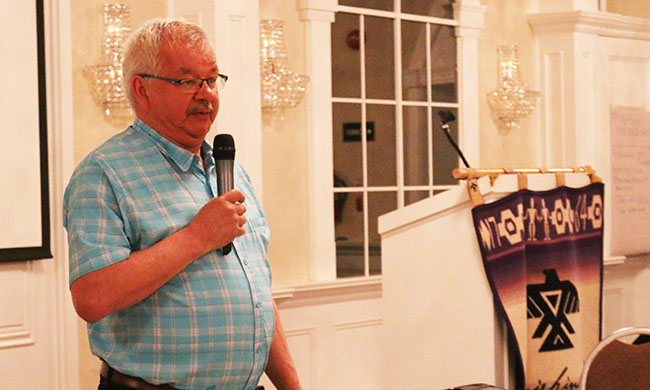Koganaawsawin conference offered participants tools for youth

By Marci Becking
ORILLIA – The Koganaawsawin Conference was held March 20-21 in Orillia with speakers from all over Anishinabek Territory.
Social Services Director Adrienne Pelletier says that the official launch of the Anishinabek Nation Child Well-Being Law will be in September of this year.
“Fill the bus!” Pelletier says. She wants as many Anishinabek citizens to participate in the September event. “The Anishinabek Nation Child Well-Being Law is about protecting the Spirit of the child.”
Participants of the conference also heard Trisha Trudeau from Wiikwemkoong speak about Aanish Naa Gegii – an Aboriginal Child Health and Well-Being Measure to find out how children are doing. It is a 62-item health and well-being assessment for children 8 to 18 years of age
“It was developed with and for Aboriginal children,” says Trudeau. “The Aboriginal Child Health and Well-being Measure process includes an important triage component to connect children at potential risk to local services. It gives children a voice in their own health assessment while ensuring their safety by demonstrating we are listening. Aanish Naa Gegii is now being shared with other communities, for the benefit of children.”
Trudeau says that 35 First Nations have adopted Aanish Naa Gegii and her team has started to do training for First Nations in B. C.
Vince Pawis, one of the conference presenters, is the executive director of the White Buffalo Road Healing Lodge. He goes into the provincial prisons and says he has had a positive impact on inmate – teaching them their culture and who they are.
“Sometimes our young ones aren’t adults at 18 or 29. Sometimes it takes them until they are 40 to grow up. Take the alcohol and the drugs from them and most of them are good people. They’ve just made bad choices,” says Pawis. “It’s the underlying trauma that they have to deal with. What I saw is that their children who were coming in right behind them – they were taught to do criminal activity. Even as babies they learn to steal to eat or they are addicted to something. They think that is normal.
“The White Buffalo came to me in dreams. I went into working in the jails – only looking for a job for three months…22 years later I am still there.”
Pawis says that many inmates come from CAS and they don’t know who they are – they have no connection to the land.
At the White Buffalo Healing Lodge, they have youth camps where the children learn how to harvest.
“When we fed the children moose, fish and tradition food that they harvested, there is a lot of pride,” says Pawis. “What they harvest they take home to their family. We also talk about the One Dish, One Spoon treaty, the Robinson Huron Treaty and Treaty harvesting rights. It has had a huge impact on these children. Many will say – it’s nice to learn these teachings, but my parents won’t know them.”
He says it’s up to the kids to bring those teachings to their parents.


